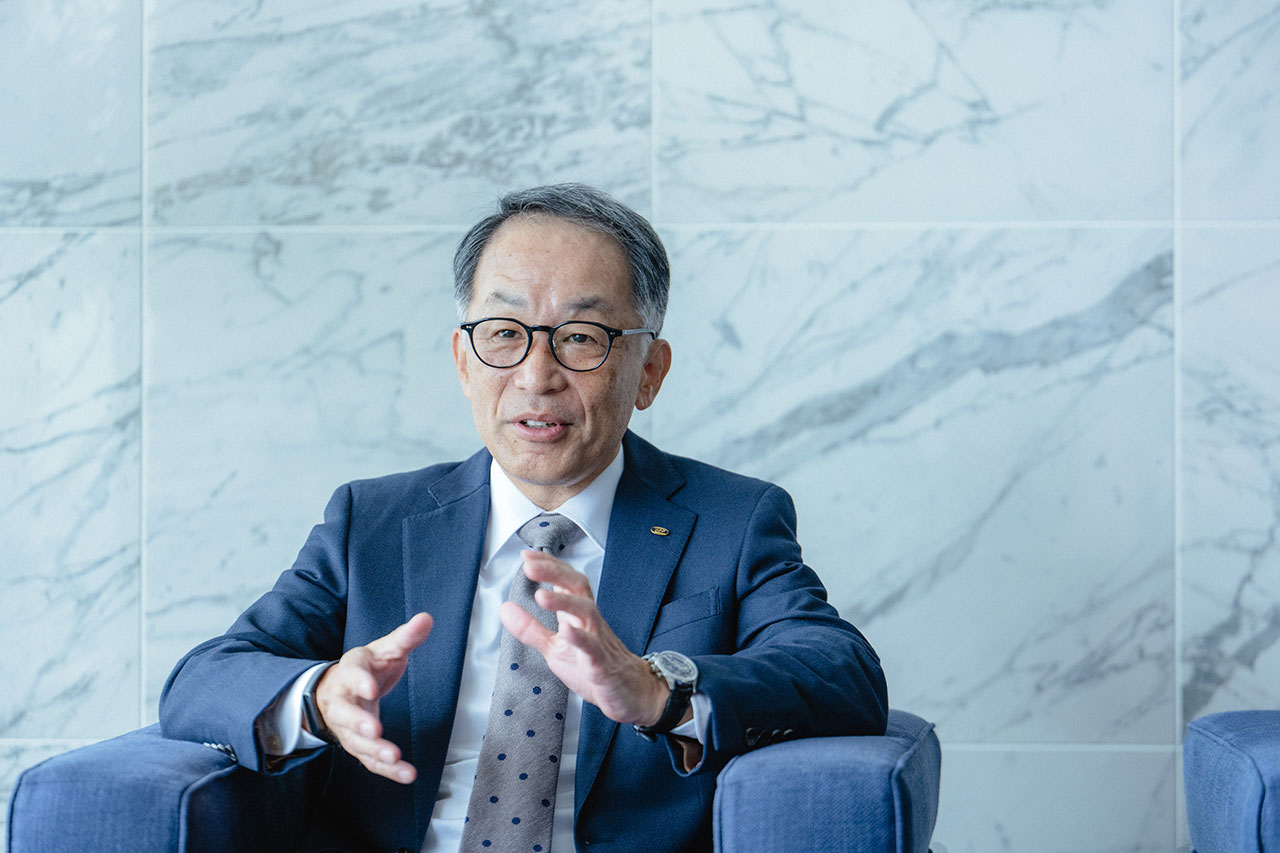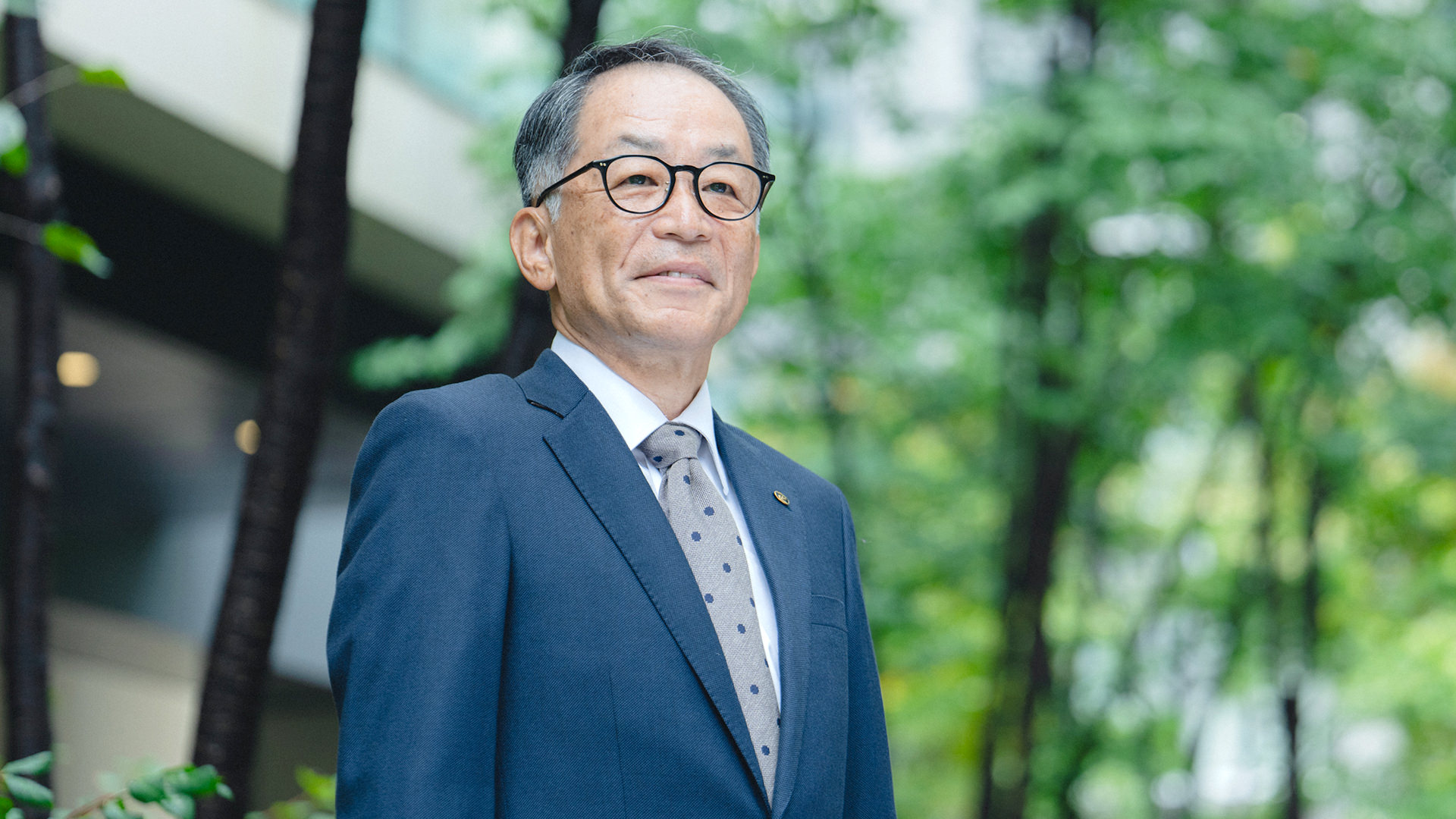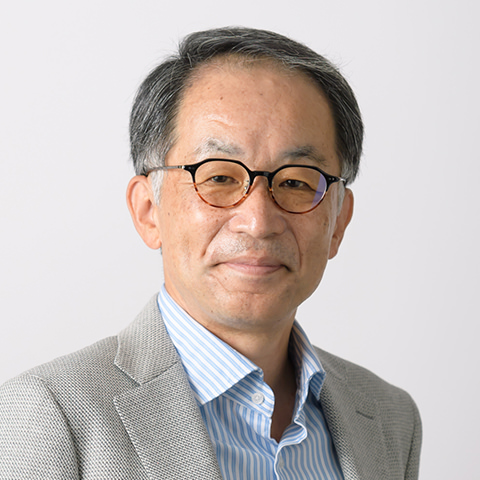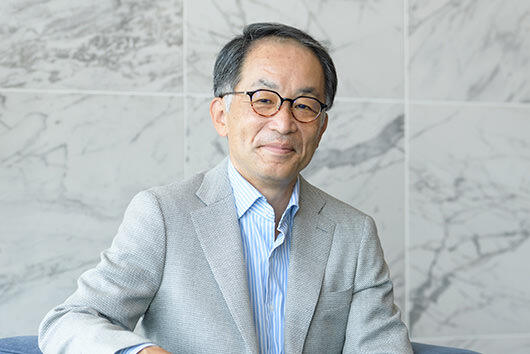To achieve its Group Vision 2030, PACIFIC CONSULTANTS GROUP has formulated its "Medium-Term Management Plan 2028 - Transformation and Growth, Shaping the Future Together," which will begin in October 2025. The basic policies of the Medium-Term Management Plan 2028 are "Contributing to a Sustainable Society," "Enhancing Diverse Human Resources," and "Strengthening the Group's Management Foundation." As a pioneer in social infrastructure services, the Group aims not only to predict the future, but also to create a "Future with Hope" with its imagination and implementation capabilities. Representative Director, President Executive Officer Osamu OMOTO shares the vision behind the Medium-Term Management Plan 2028.
INDEX
- The world and Japan at a turning point
- We cannot build a prosperous future by continuing with the same old measures
- Transition to a new group management structure
- Addressing increasingly complex social issues through the active participation of diverse human resources
- Actively promoting open innovation
The world and Japan at a turning point
The world is currently at a major turning point. Ongoing conflicts in various regions and the increasing frequency and severity of natural disasters due to climate change are causing serious damage to society. The international community is becoming increasingly divided, and the various systems that have been established up to now are experiencing significant strain. In Japan, too, abnormally high summer temperatures and floods and landslides caused by sudden heavy rains due to global warming are on the rise, and damage to crops is becoming more serious. Many people are now feeling firsthand the serious impact that global warming is having on our daily lives.
Furthermore, Japan's overall population is declining and its aging population is progressing at a faster pace than expected. As of January 2025, the Japanese population is expected to have decreased by more than 900,000 people in just one year from the previous year, a figure equivalent to the entire population of Wakayama Prefecture. If this trend continues, some estimates suggest the total population will fall below 100 million in the early 2050s, and fall to around 80 million by 2070 *.
*National Institute of Population and Social Security Research, "Japan's Future Population Estimation (Estimated in 2023)" Low Fertility Estimation
The changes from year to year may not be large, but what will happen if 10 or 20 years pass like this? We have to say that we are at a major turning point in history, something we have never experienced since the end of the war.
We have been working to resolve various social issues, upholding our commitment to "Realizing a prosperous life without threat or disparity for everyone in the world" and "Protecting the beautiful Earth, the source of all life, and its environment for future generations." Our history spans 75 years, dating back to the founding of U.S. Corporation, PACIFIC CONSULTANTS, in 1951. During that time, we have consistently been involved in the development of national infrastructure, promoting a variety of businesses centered on infrastructure engineering services to realize a prosperous and secure life for people. However, we believe that continuing on the same path will make it difficult to adequately respond to changes in society and the environment and provide further value in the future.
We cannot build a prosperous future by continuing with the same old measures
Infrastructure development is entering a new phase. Looking at the world, developing countries have achieved a certain level of infrastructure development, including the construction of power plants, roads, bridges, high-speed railways, and subways. However, severe traffic congestion continues to occur, hindering socioeconomic activity. This has led to a new demand for transit-oriented development (TOD), which focuses on developing urban functions around train stations and other facilities, rather than relying solely on cars. Many railways, airports, and other facilities constructed through international cooperation are now 20 or 30 years old. In addition to establishing maintenance systems, updating equipment, and developing human resources, there is also a need to strengthen disaster prevention measures and promote energy transitions aimed at achieving carbon neutrality.
The aging of infrastructure in Japan is also accelerating. Roads, bridges, water supply and sewerage systems, etc., which were built in one fell swoop during the period of rapid economic growth, are all reaching the time for repair and replacement at the same time. By 2030, 54% of road bridges will be more than 50 years old, and by 2040, 75% will be more than 50 years old. However, the sewerage facilities in Yashio City, Saitama Prefecture, were the cause of a large-scale road collapse accident before the 50th year of construction.
On the other hand, there are many cases where infrastructure maintenance and renewal cannot be carried out as planned due to a lack of manpower and funds, and in some areas, the possibility of removing bridges is being considered as a triage (selection) measure.
As manpower and funding shortages become even more severe in the future, urgent issues include how to operate, maintain, and renew this vast infrastructure, and how to establish wide-area, comprehensive initiatives, including PPP, when prefectures and local governments cannot handle the task alone. Equally important issues include how to respond to urban flooding, such as inland flooding caused by localized heavy rains that are becoming more frequent due to global warming, and how to accelerate efforts to reduce greenhouse gas emissions in the first place.
Furthermore, urban development requires a shift from car-centered development to people-centered development, and disaster prevention and mitigation measures, which are essential for safe citizen lives, must be combined not only with hard aspects such as strengthening levees and seawalls, but also with soft aspects such as reexamining land use itself and establishing systems to ensure appropriate evacuation.
Transition to a new group management structure
In order to quickly identify and resolve issues that are becoming increasingly complex and diverse, we believe that we ourselves, who have been at the forefront of infrastructure development, must change. We believe that it is important for us to grow as a global corporate group by collaborating with a variety of partner companies, creating innovation, and enhancing our business portfolio.
There are many companies outside of infrastructure development that share our vision for the future. We will focus on "Solving problems from the customer's perspective" by approaching private companies more broadly, gaining a deeper understanding of the challenges they face, and providing solutions. We will work with like-minded customers and business partners to create new solutions and lead the way in realizing the future we envision.
For this reason, in our Medium-Term Management Plan 2028, which began in October 2025, we decided to make bold reforms to our group corporate structure, including transforming PACIFIC CONSULTANTS GROUP into a holding company and establishment a new international business company. Transforming into a holding company demonstrates our intention to become a corporate group that goes beyond the framework of construction consulting, enhances our business portfolio, and provides greater value to society. While growing the international business company as our second pillar, we will seek out new businesses that differ from our traditional consulting business and aim to establishment our next business company as our next pillar. We will clarify our management strategy as a group and work to solve a variety of issues both domestically and internationally.

Addressing increasingly complex social issues through the active participation of diverse human resources
In parallel with the transformation of our group's corporate structure, we are actively investing in our human resources. By establishing a foundation where diverse talent can demonstrate their individual strengths and grow, we aim to maximize the overall strength of the entire group. As part of this, our Medium-Term Management Plan 2028 sets specific non-financial key performance indicators (KPIs), including a 15% female managerial ratio, 110 foreign national employees, and a 20% reduction in overtime work hours. We are also reviewing our career paths, transforming them from the traditional one-way "Single Climbing Ladder" model to a "Jungle Gym" model that allows employees to progress up, down, left, right, and diagonally. In addition to promotion to management, we are providing options for employees who wish to master their skills to develop as specialists, making our career paths more flexible and responsive to each individual's aspirations. By establishing a system that allows employees to continue working long-term and grow in a way that suits their current circumstances and aspirations, we will bring together the strengths of our diverse talent and achieve new corporate growth.
Actively promoting open innovation
As one of the concrete actions based on the Medium-Term Management Plan 2028, on September 1, 2025, we launched the PACIFIC CONSULTANTS's Co-Creation Program 2025, an open innovation program that will bring about innovation to create new services and new markets with co-creation partners.
This program aims to create new value by combining the technology and knowledge that our company has cultivated over many years with the innovative ideas and speed of startup companies in order to realize a sustainable society, and is widely seeking co-creation partners under four specific themes, including strengthening disaster resilience and implementing GX (Green Transformation). In addition to utilizing this program, we will also work with venture companies working on developing new technologies and services, establishing a system that allows us to create technologies and services that we have never had before, with the aim of creating and growing new businesses.
As new questions arise about how to build the infrastructure of the next era, we will not be limited to conventional frameworks or ideas, but will provide cutting-edge services centered on infrastructure engineering and proactively take on new business ventures together with new partners.
PACIFIC CONSULTANTS GROUP will create new solutions and lead the way in realizing the society we envision for 2050 and beyond.







